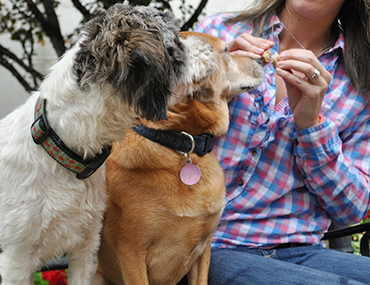Yes, Dogs can Have Food Allergies
Dogs, like people, can have allergies to certain foods. In fact, food allergies are one of the most common allergic reactions known to affect our canine buddies. When your dog is allergic to a particular food, his immune system responds to the food as it might respond to an infection or bee sting, producing antibodies that in turn cause the symptoms associated with the allergic response.
We all know dogs are “garbage guts” and will eat, well, a wide range of stuff. Sometimes it’s hard to distinguish a little upset stomach from an allergic reaction to food. When symptoms such as diarrhea persist, allergies may be the cause. These symptoms usually take time to develop, since your dog’s immune response takes time to produce the antibodies that cause the allergic response.

Symptoms of Food Allergies in Dogs
The most common symptoms of a food allergy are:
- Itching
- Hair loss
- Skin infection
- Less common symptoms include:
- Vomiting
- Diarrhea
- Weight loss
- Lethargy
- Hyperactivity
- Sometimes, dogs show more aggression because of their discomfort.
The most common foods that cause canine food allergies are proteins such as lamb, beef, chicken, and eggs. In addition, some dogs can be allergic to soy or gluten, which is found in wheat and similar grains. Some dogs may be allergic to preservatives or other food additives, as well.
When a dog eats a food he is allergic to, a vicious cycle occurs: he eats, his body produces an allergic reaction, and he becomes symptomatic, i.e., he itches, has diarrhea, or may vomit—which is why it is so important to identify the food for which he is having the reaction!
Diagnosing Food Allergies in Dogs
If your veterinarian suspects your poor pooch of having a food allergy, he or she will perform a thorough physical exam and take a detailed history of your dog’s food intake and activities. In addition, your veterinarian may recommend routine diagnostics to rule out other causes of your dog’s symptoms.
Your veterinarian will likely recommend a strict hypoallergenic diet trial for at least 2–3 months to see if it alleviates your dog’s symptoms. The suggested diet cannot contain any ingredients your dog has been recently eating; there are several specifically designed diets to help prevent food allergies. During the food trial, it is critical that your dog does not get any treats or supplementsunless approved by your veterinarian.
Treatment for Dogs With Food Allergies
The best treatment for food allergies is avoidance. Once you’ve identified the food your four-legged friend is allergic to, you will be able to avoid it in the future and help your dog live an allergy-free life. Unfortunately, there is no way to prevent your dog from developing food allergies.
If you have questions about canine food allergies, please talk with your veterinarian—the best resource when it comes to the health and well-being of your best friend.
If you have any questions or concerns, you should always visit or call your veterinarian – they are your best resource to ensure the health and well-being of your pets.
